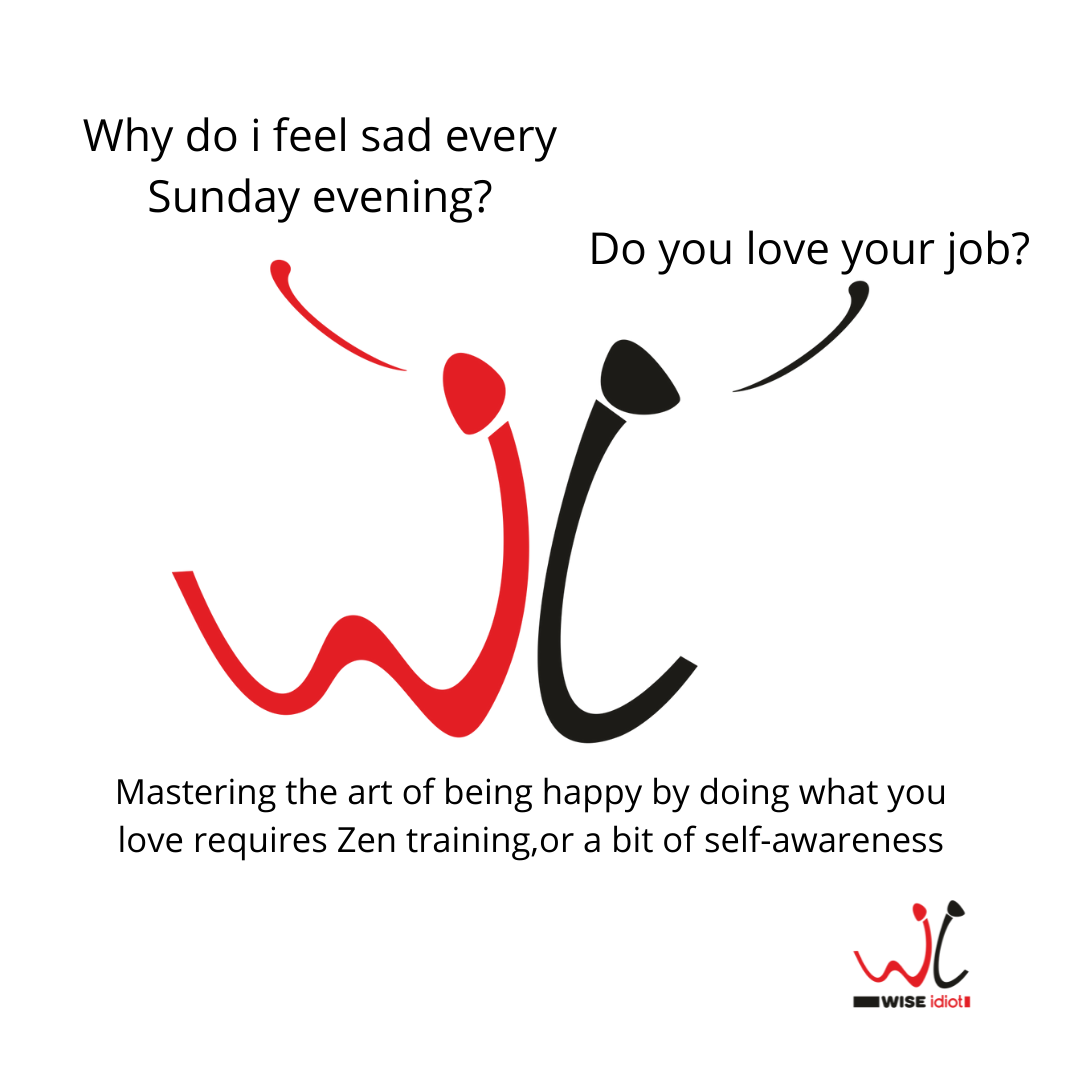
Why do i feel sad every Sunday evening? Or the power of writing to change your life
As the Sunday rolls along, finding reasons to celebrate the coming week is a key factor to being happy. What exciting things will you do next week? What new things do you plan to learn? Have you got a daily schedule planner yet? You have 10,080 minutes next week like everyone else. How will you make them count? Carpe diem and Carpe noctem. It’s your life. Own it. Also, remember to b-r-e-a-t-h-e.
If on the other hand, you are sad because the weekend has ended, then you need to revisit your life and look at it with a fresh perspective.
This is the third instalment of our series on work-life balance. We are looking at why we get it wrong and what we can do about it. The first part of the series was on understanding that the concept of work as we understand it is a social construct and why doing what we love the smart way may be the key. The second part of the series focussed on introspection and why looking inward is critical to living the life we dream of.
In this third part, we look at how writing down how you feel every Sunday evening and making a list of interesting things to do in the coming week helps you have a more balanced approach where you are in control.
How writing changes you
The act of writing is over-advertised but few of us do it. Let’s take a look at what happens when you put a pen to paper.
If you notice most of the physical activities you do are ones over which you have some control. You decide whether you want to walk, sit, eat, see, read or hear. You may choose to do something else. The freedom this action gives us is underappreciated. Think what will happen if you cannot walk or sit or read or see or do anything you want unless someone else allows you to do so. Suddenly the freedom will seem precious. Think back to how you felt when you started living independently for the first time and realised you could do anything you want whenever you want. There was no one telling you what to eat or when to sleep.
This freedom is one of the fundamental facets that help us live meaningful lives. It forms the basis of how happy we are and what we create. Civilisations have started and evolved because of this freedom. Everything you see around is the result of this freedom. No one created your home, your mobile, your clothes, or most things you see sitting in a jail. Creating these things was their work of choice. That is why things around us evolve and get better. We find ways to improve what we do.
The same freedom applies to the art of writing. You write what you want. This gives you freedom and as a result, power over the event. When you put your thoughts to paper, magic happens. Your ideas get better, more fleshed out. Your thoughts find shape. Your questions find answers.
Writing can be a meandering mess for a wannabe poet but from that mess flows beauty and sanity. There has been some research on writing and this is what they say:
Writing Can Help You Think
Linguist Walter Ong observed that writing is necessary to help the human mind achieve its full potential. It helps you give shape to abstract ideas and to connect the dots in your knowledge. Certain types of writing, which we discuss a bit later, help in intellectual vitality, creativity and thinking. For example, a study by Klein and Boals (2001) found that memories of significant life events improve when adults write about such events.
Writing improves cognitive skills since it requires focusing one’s attention, planning and forethought, organisation of one’s thinking, and reflective thought, among other abilities. In other words, as you write, these skills become better through practice and reinforcement.
Writing Can Help You Feel Good
Writing and emotional health
Research by University of Texas-Austin cognitive psychologist James Pennebaker has shown that writing helps heal emotional wounds.
Short-term, focused writing helps people with terminal illness, victims of violent crime, and even new college students struggling with the transition from school to college.
A simple 20-minute writing assignment over four consecutive days for participants to write about their deepest emotions and thoughts about the upheaval in their lives helped them feel happier and less negative than before this writing experience. They also had fewer symptoms of depression and anxiety.
Even brief expressive writing improves immune system functioning, reduces the number of visits to a doctor, and helps in academic performance, regardless of age.
Writing and physical health
Writing also leads to improvement in physical health. Research by Smyth, Stone, Hurewitz and Kaell (1999) on asthmatic patients showed that writing about stressful events showed improvements in lung function. The same experiment on rheumatoid arthritis patients showed improvements in overall disease activity. The observed improvements were beyond those that could be attributed to the standard medical care that all participants received.
Writing about upsetting events with the intent to find meaning improves overall health. There is also greater awareness of the positive aspects of a stressful event. In another study, journaling about thoughts and feelings during their most traumatic experiences such as divorce, grief and abuse, helped participants who received hepatitis B vaccine and booster shots develop more antibodies.
If you have noticed, all the research talk of trying to find meaning in life through writing. Writing just for the sake of writing or writing about neutral events does not do much good.
If you find yourself stressed out on Sunday evenings dreading the week ahead, then writing about your feelings to understand the problem and arrive at a solution is a good way to move ahead. This writing makes you more self-aware and therefore, receptive to solutions.
Types of writing
There are three types of writing that help you improve your self-awareness.
#1: Expressive writing
This is the writing used in the research we touched upon in the previous section. Expressive writing is mostly used in therapeutic settings. People are asked to write about their thoughts and feelings related to stressful life events. This type of writing helps people to emotionally process something difficult.
As we had mentioned, research shows that expressive writing can enhance self-awareness thereby decreasing depressive symptoms, anxious thoughts and perceived stress.
#2: Reflective writing
Reflective writing is used in professional settings. It helps people like healthcare workers, nurses, doctors, psychologists, social workers and teachers become more effective at their jobs. This writing gives people a way to assess their beliefs and actions explicitly for learning and development.
Reflective writing requires you to ask yourself questions and be open, curious and analytical. It increases self-awareness by helping us learn from our experiences and interactions. It improves professional and personal relationships as well as work performance.
#3: Creative writing
This type of writing is what gives us poems, stories and novels. It involves the imagination more than the other two types and lets us play with our thoughts, feelings, ideas and beliefs. It also offers us a way to communicate things that are too complicated or difficult to say directly.
This type of writing encourages us to play with words, metaphors and images in unique ways to convey what we feel. This creative decision-making leads to increased self-awareness and self-esteem as well as improved mental health just like the other two.
Next steps
Now that you know the different types of writing, you can choose which of the three works best for you.
But let’s be honest here. We are being a bit nerdy and it is not fair to ask you to choose a style and find your way through.
So, write what you want to write – in whatever way you want to write. Just go with the intent to find a solution – the meaning you want to find.
Plan the week so that you give yourself a treat or two. It may be nice meal, a walk, a conversation, a book or a season of a show to binge-watch. Using what you like to do to make the day and the week more pleasant will help you have a better week.
Add one thing that will one day change your life. It may an online course, a series of books, a lecture series, a side hustle – whatever you want. Doing it once or twice in the week means you will have taken over 50 or 100 steps in the year ahead and this means you will have travelled far more than you would have if you hadn’t put your pen to paper.
So, write away. Make lists, mind maps, doodle – do whatever you like to do. Feel more in control of your future.
In case you are wondering what are mind maps, here is a video by Tony Buzan, the inventor of mind maps.
Video too long? You can also watch the video as the original series by going here.
If all of this is too daunting for you, here is how to start so you can reap the benefits of writing in just 4 days:
How to start writing the easy way
- Fix a time when you are free for 20 minutes
- Find a quiet spot and start to write about:
- The things that you hate about your job
- Why they occur
- What are your emotions during these moments
- What can you do about them
- What small steps can you take that day to live the life you want to have
- What are the rewards you can give yourself
- Take it slow. It takes time to process your life. Give yourself the time
- Do it for 4 days.
At the end of these 4 days, you will have a clear idea of what you need to do. All you have to do now is to get started.
The next two parts of our series on work-life balance can be read here (get rid of Monday Blues) and here.





